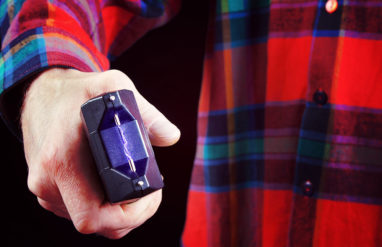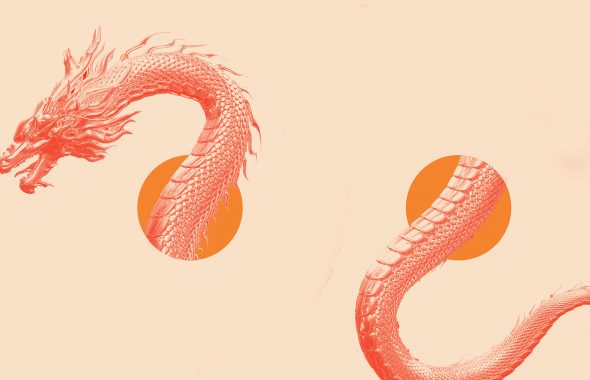How well do you know your British slang? No, we aren’t talking about words like brilliant or bloke—you probably know these. We want to challenge you with some slang words that might not be as widely known by American English speakers. The world of British slang is vast, and it includes everything from modern abbreviations to terms that have existed for a century. So let’s dive in and learn some other UK originals that you might hear more often if you mingle with the locals.
bruv
In the US, we have friend terms like bro and bruh. In the UK, they have bruv. Bruv is short for brother, as in “fellow; buddy.” It’s a familiar term typically used between male friends, close relations, or even actual brothers. Bruvver is one regional (especially Cockney) pronunciation of brother in the UK, and bruv is a shortening of that.
oojah
You’ve likely heard of a doohickey or whatchamacallit, but what about an oojah? It’s a handy British word for an object you just can’t quite remember the name of. One of the earliest uses of the term in print appears in a 1917 Washington Post article about military slang. That means it’s stuck around for more than 100 years.
innit
It’s a good time to learn some new words, innit? This well known British word is unique because it’s actually a slang contraction. It’s a shortened form of the phrase isn’t it. Innit has roots in the Asian and Jamaican communities in London. It was also popularized by Ali G, a fictional British character played by comedian Sacha Baron Cohen.
peng
If something is peng, that means it’s attractive or appealing. Frequently, the term applies to good-looking people, but it can also be used to describe other things that look good, like clothing or food items. Peng is an example of modern British slang, as evidenced by its use on current popular shows like “Love Island.”
chuffed
Chuffed means “delighted, pleased, satisfied.” You might say you’re chuffed that your favorite team won the soccer game. This word dates back to the 1800s, when it was originally used to mean “puffed up with fat.” It later became a slang term to express satisfaction. Victorian fiction enthusiasts may also recognize chuffed, though in literature it means the opposite: “annoyed; disgruntled; displeased.”
knackered
Long day? Knackered is British slang for “very tired.” It was first recorded in English in the late 1880s from knacker, or “to tire.” It’s related to an earlier sense of knacker that meant “to kill.” Luckily, the meaning today is much less shocking. Though it’s an older word, knackered is still relevant and used frequently.
barmy
Barmy means “crazy; foolish; eccentric.” It’s thought to be an alteration of the word balmy, meaning “foolish.” This sense was first recorded in the 1800s and has an interesting history. Before baker’s yeast was widely available, bakers used a “barm tub” to let bits of dough ferment into leavening. Some would drink this fermented alcoholic brew, making them barmy.
bants
If you meet up for some bants, you’re in for “playful teasing or mocking.” Bants is a shortened form of banter, the English word that means “an exchange of light, playful, teasing remarks; good-natured raillery.” Banter was recorded in English beginning in the 1660s, but bants is a more recent sense of the word that’s popular among young people in the UK.
antwackie
Now, let’s talk about a throwback word. Antwackie isn’t just an older word itself, it actually means “old fashioned.” Generally, it’s slang that’s used to describe people who are old fashioned or out of date. It’s thought to be related to the word antique (perhaps combined with the word wacky for humorous effect), though the exact origins aren’t known.
Talk about old-fashioned! How many of these old-timey dating slang words do you know?
ace
This next word is ace. In British slang, ace means “excellent; first-rate; outstanding.” Whereas Americans might say they aced a test, ace is used in the UK as an adjective, like that movie was ace. This usage is most popular in Northern England and among young people.
damp squib
You could say disappointment, or you could say damp squib. This unique phrase means “something meant (to) but failing to impress or succeed.” To understand this one, you first need to know what a squib is. It’s a word for a small firework. Therefore, a damp squib would be like a damp firework that doesn’t explode as intended. It’s meant to be great, but it ends up being lackluster. This usage has been around since the late 1960s.
scrummy
Have you had anything scrummy lately? You probably have because scrummy is short for scrumptious. Though these words fit right in among modern English speakers, they actually date back to the 1800s!
gobby
Gobby is a word that might describe the loudest person in the room, depending on what room you’re in. It means “loud-mouthed and offensive.” It’s used to describe someone who is very talkative and opinionated—and not necessarily in a good way. It’s not known where this term originated, but the UK slang sense has been in use since the 1800s.
tosh
If someone speaks a lot of tosh, that means they are talking “nonsense; rubbish.” In American English, it would fit right in among words like malarkey or baloney. You might say the new season of a popular TV show is absolute tosh or that a candidate’s speech is a load of tosh. This sense developed late in the 1800s.
ledge
Abbreviations abound in British slang, and ledge is no exception. This term is short for legend, and though it can be used in a genuine way, it’s often used ironically or in good-natured jest. Think: Paul saved me a seat in the cafeteria like a total ledge. Ledge is a good example of British slang that might be used as textspeak and primarily among teens and young adults.
Enough bants, it’s time to take the quiz!
Have you been reading carefully while sipping on some English Breakfast (or something tastier, hopefully)? We’d be chuffed if you took your knowledge to the next level by taking our quiz on these slang terms. And if you think this article is ace, just wait until you visit our British Slang word list!














